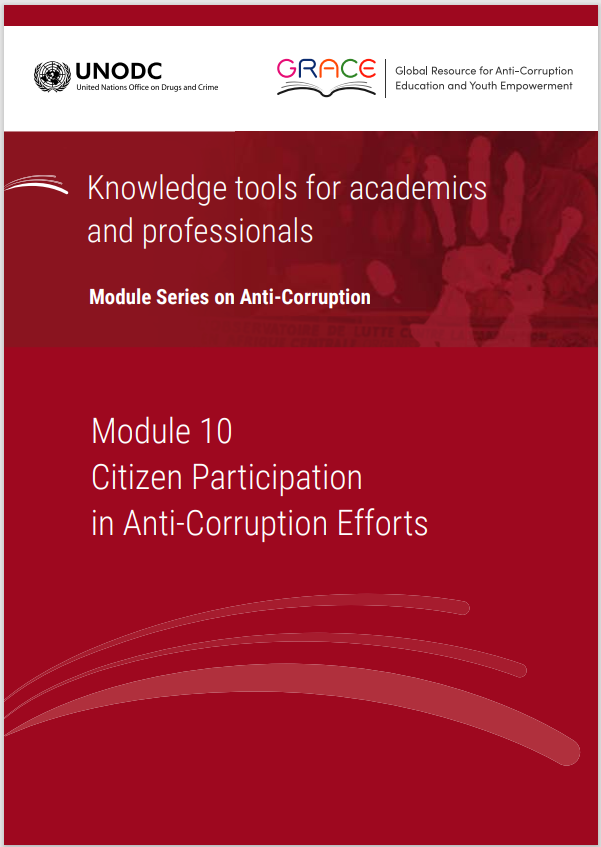This module is a resource for lecturers
Advanced reading
The following readings are recommended for students interested in exploring the topics of this Module in more detail, and for lecturers teaching the Module:
- Bauhr, Monika, and Marcia Grimes (2017). Transparency to Curb Corruption? Concepts, Measures and Empirical Merit. Crime, Law and Social Change, vol. 68, issue 4 (November), pp. 431-458.
- Benkler, Yochai (2011). A Free Irresponsible Press: Wikileaks and the battle over the soul of the networked fourth estate. Harvard Civil Rights-Civil Liberties Law Review.
- Bertot, John C., Paul Jaeger, and Justin Grimes (2010). Using ICTs to create a culture of transparency: E-government and social media as openness and anti-corruption tools for societies. Government Information Quarterly, vol. 27, issue 3 (July), pp. 264-271.
- Bingham, Lisa Blomgren, Tina Nabatchi, and Rosemary O'Leary (2005). The New Governance: Practices and Processes for Stakeholder and Citizen Participation in the Work of Government . Public Administration Review, vol. 6, issue 5 (September), pp. 547-558.
- Chêne, Marie (2011). Use of mobile phones to detect and deter corruption . Bergen, Norway: U4 Anti-Corruption Resource Centre, Chr. Michelsen Institute.
- Dupuy, Kendra (2017). The Global Participation Backlash: Implications for Natural Resource Initiatives . Bergen, Norway: U4 Anti-Corruption Resource Centre, Chr. Michelsen Institute.
- Kamstra, Jelmer (2017). Dialogue and Dissent Theory of Change 2.0: Supporting Civil Society's Political Role. The Hague: Ministry of Foreign Affairs of the Netherlands Social Development Department Civil Society Unit.
- Kaplan, Andreas and Michael Haenlin (2010). Users of the World Unite: The challenges and opportunities of social media. Business Horizons, vol . 53, issue 1 (January-February), pp. 59-68.
- Kossow, Niklas and Victoria Dykes (2018). Blockchain, bitcoin and corruption: a review of the linkages. Berlin: Transparency International . Berlin: Transparency International.
- Kukutschka, Roberto (2016). Technology against corruption- the potential of online corruption reporting apps and other platforms . Bergen, Norway: U4 Anti-Corruption Resource Centre, Chr. Michelsen Institute.
- Kumar, Krishan (1993). Civil-Society - An Inquiry into The Usefulness of An Historical Term. British Journal of Sociology, vol. 44, no. 3 (September) pp. 375-395.
- Mauro, Paolo (1996). The effects of corruption on growth, investment and government expenditure . International Monetary Fund.
- Muhangi, Denis (2004). Study of Civil Society Organizations in Uganda . Uganda Program For Human and Holistic Development.
- Linders, Dennis (2012). From e-government to we-government: Defining a typology for citizen coproduction in the age of social media. Government Information Quarterly, vol. 29, issue 4, pp. 446-454.
- Mendes, Mara (2013). Corruption in the media in developing countries . Bergen, Norway: U4 Anti-Corruption Resource Centre, Chr. Michelsen Institute.
- Morris, Stephen (2008). Disaggregating Corruption: A Comparison of Participation and Perceptions in Latin America with a Focus on Mexico. Bulletin of Latin American Research, vol. 27, issue 3 (July), pp.388-409.
- Moschini, Silvina (2019). Transparency and tech together can safeguard taxpayers' money. World Economic Forum, 26 August.
- Roberts, Nancy (2008). The Age of Direct Citizen Participation. London; New York: Routledge.
- Sansito, Carlos (2018). Can blockchain help in the fight against corruption? World Economic Forum, 12 March.
- Song, Changsoo and Jooho Lee (2016). Citizens' Use of Social Media in Government, Perceived Transparency, and Trust in Government. Public Performance and Management Review, vol. 39, issue 2, pp. 430-453.
- Smith, Graham (2009). Democratic Innovations: Designing institutions for citizen participation (Chapter 1). Cambridge University Press.
- Tronsor, Elizabeth, and Julius Hinks (2019). Real Lives, Real Stories: The Power of Information in Asia Pacific . Berlin: Transparency International.
- United Nations Office on Drugs and Crime (2004). Global Action against Corruption: The Merida papers . Vienna.
- United Nations Office on Drugs and Crime (2013). Reporting on Corruption - A resource tool for governments and journalists . New York; Vienna.
- Wickberg, Sofia (2013). Technological innovations to identify and reduce corruption . Bergen, Norway: U4 Anti-Corruption Resource Centre, Chr. Michelsen Institute.
 Next: Student assessment
Next: Student assessment
 Back to top
Back to top
